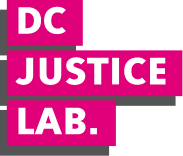DC Justice Library
DC Justice Lab pulled together research, information, and stories about the public safety issues in the District of Columbia, for you to use as a reference library and share with others.
Learn more about how to change DC’s approach to

Solutions that refocus prosecution on enhancing safety and minimizing the harm tied to justice system involvement.
How to change the law
Our guide dissects the political process and shows you how to change policy and build a city that is safer, freer, and more equal.
Many thanks to our pro bono partners for assisting DC Justice Lab with research.






★★★★★★★★★★★★★★★★★★★★★★★★★★★★★★★★★★★★★★★★★★★★★★★★
To transform DC's criminal legal process, understanding its historical roots and current policies is crucial. Through this new library launch, DCJL provides insights into what's needed for the district to evolve into a safer city.
Where are we now?
Today, DC's criminal legal system is steering us away from becoming a safer, freer, and more equal community.
DC grapples with higher crime rates and less safety than we can accept. Serious violent crimes cluster in neglected areas—those with the lowest incomes and highest unemployment. These neglected areas also face disproportionate incarceration and invasive policing.
Our current system is costly, ineffective, and unjust. Research reveals that ‘tough-on-crime’ policies can actually fuel more crime. Over $1.6 billion is poured into DC’s justice system yearly, with 20,000 individuals in prison or supervision. Disproportionately, nearly nine out of ten impacted are Black.
Despite previous attempts, large-scale reforms have not materialized. The convoluted policy process and lack of implementation hinder progress. The result is that hundreds of proposals that have been developed and vetted to reduce the footprint of policing, prosecution, and punishment in DC in favor of investing in the health and well-being of residents have not been implemented. It’s time to steer away from punishment and invest in our community’s well-being.
How did we get here?
We’ve spent billions on a failing justice system in DC. Our lack of local control hinders decision-making on safety policies. Unlike other states, prosecutors in DC don’t need to be a member of the bar and adhere to local ethical standards. And people from DC serving time are housed far from home under federal jurisdiction.
In crucial city-controlled aspects, criminal justice policies are implemented without community engagement. Decisions happen in a few government buildings downtown and not in the neighborhoods directly impacted. Crime victims or individuals who’ve caused harm may be consulted for ideas or asked to support others’ policy proposals. However, they often don’t have the primary influence in shaping the specific language that dictates how they are governed and treated.Thus, criminal justice policies are rushed; they lack input from those directly impacted; and the laws can inadvertently increase crime rates.
Legislation grants broad authority to police and prosecutors, assuming proper discretion. Oversight is limited, often only in annual budget reviews. We need a change for safer and more just policies.
Where are we going?
We’re shifting away from ‘tough-on-crime’ approaches that exacerbate instability. Instead, we embrace research: fewer police stops, less prosecution for minor offenses, and shorter sentences.
Our goal is a rule of law system that is accountable, transparent, accessible, and impartial. This means more safety, economic growth, health, and equality for DC residents.
We’re building a more restrained criminal justice system, one that is more parsimonious focusing on minimal punishment for safety. Unjust or excessive punishment leads to more violence. We prioritize the least restrictive response to behavior.
Our policies aim at healing and empowering individuals post-harm to prevent recurrence.
We’re progressing toward a Safe and Free DC, where those most affected by the legal system drive change, reducing federal government influence on safety policy.
Read more about how we can get to a safer, freer and more equal DC through the articles here on policing, prosecution, and punishment, and how to navigate the political process to get there.
★★★★★★★★★★★★★★★★★★★★★★★★★★★★★★★★★★★★★★★★★★★★★★★★
All articles
Policing
Prosecution
Punishment
prevention
Comments and suggestions
DC Justice Lab is supported by a number of experts and researchers across various disciplines, each of whom has shared with us their understanding of complicated legal concepts. While we deeply appreciate their contributions and may incorporate information they impart, it is important to acknowledge that these special contributors do not necessarily endorse the viewpoints that DC Justice Lab conveys in our publications. Our opinions are our own. If you are interested in contributing to the DC Justice Lab’s Library, or if you want to bring any corrections to our attention, please contact us at hello@dcjusticelab.org
Suggested Citation
Consistent with the APA style, 7th edition, the DC Justice Lab recommends the following suggested citation for these articles.
DC Justice Library. (2023). [“title of the article you are citing from”], [the full link to the page you are citing from].




